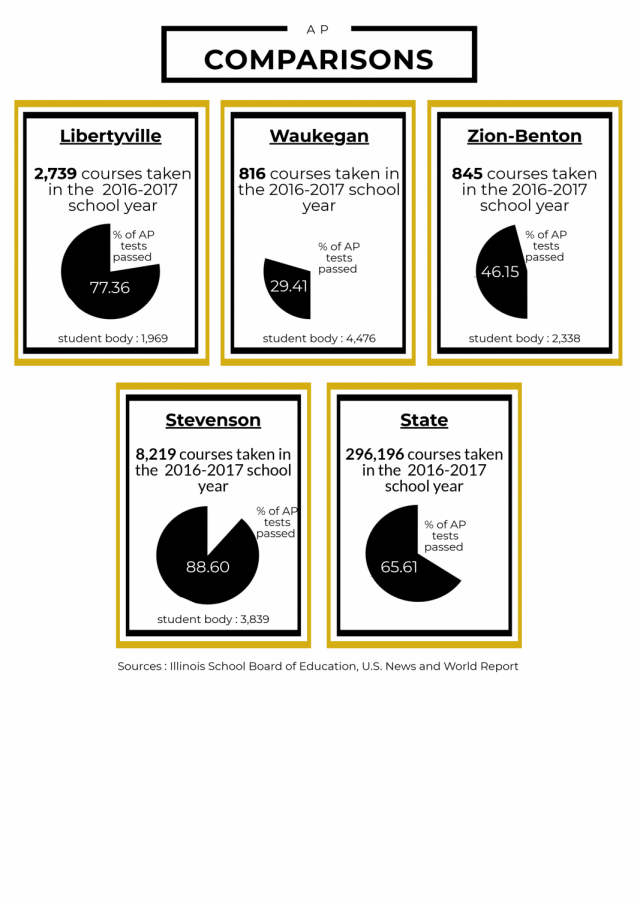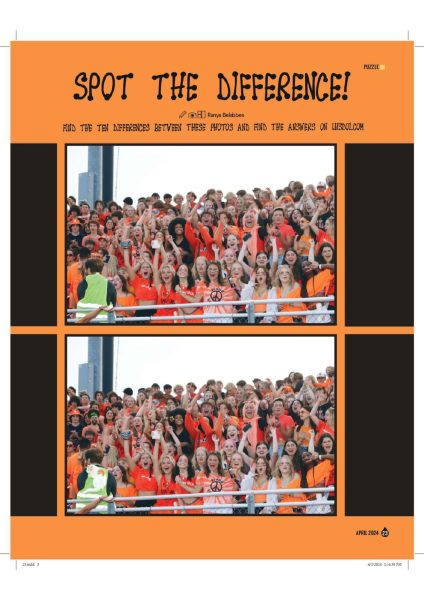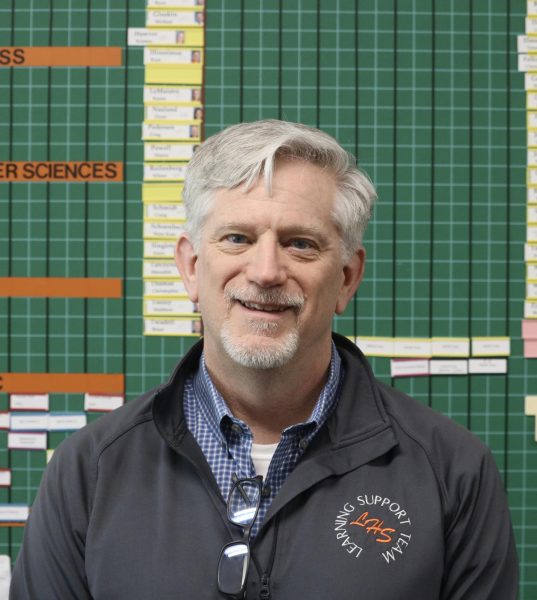Comparing Competitiveness
In recent years, schools around the nation, as well as Libertyville High School, has seen an increase of academic competitiveness, which is partially due to the drastic increase of Advanced Placement (AP) classes available.
These AP classes can increase students’ weighted Grade Point Average (GPA), since AP classes are weighted more than regular or honors-level classes. Additionally, the drive for students to take AP classes and tests has grown because some highly selective colleges look for these classes on transcripts. The number of students taking higher-level courses has increased within the past years at LHS, which can bring more opportunities for a student to learn.
In addition to the observed increase in student participation in AP courses, an increase in rigor, test scores and GPAs have elevated as well within the past decade inside the walls of LHS.
Currently at LHS, there are several teachers who attended LHS as students, many of whom have noticed the academic competitiveness amongst students.
Mr. Brady Sullivan, a math teacher who graduated from LHS in 1998, believes that Libertyville will always be a community that tries to push people to the best of their abilities.
“I feel like we have that expectation to be super involved in everything, but still do well in school and in all [our] activities, and there’s definitely a lot of pressure in our community to be good at everything. I don’t think that’s changed. That’s been here before, and it’s still here,” Mr. Sullivan said.
Senior Yvonne Montano is a student who has taken one AP class in her high school career because she is already very busy. “The teachers really push students to think for themselves and do the best they can do but it’s not to the point where it is too much,” said Yvonne over email.“ I don’t think LHS’s expectations of students are too much because we all can achieve great things, I think it’s really easy to succeed here in LHS as long as you keep up with homework and ask for help when you need it.”
Other staff members in the building, such as Ms. Amy Belstra, the College Resource Counselor, have similar beliefs about Libertyville’s atmosphere.
“I think in our community, because we are such a highly college-bound community, that that adds to [the pressure] as well,” she said. “What we want students to do is take the classes that are right for [them], where [they’re] going to be successful but [they’re] also going to be pushed a little bit.”
Montano sees LHS as a great place to learn as a high school student. “Academic competitiveness is the basis of this school. I think that everyone strives to get the best grades and be deemed as one of the top students of the school which I totally love,” she explained.
Mr. Ole Stevens, the Director of Student Services at LHS, believes in that “there’s a lot of families who move in between eighth grade and freshman year that are coming from other districts in the surrounding area to capitalize and have access to those opportunities.”
That competitiveness between students has increased partially due to the fact that information is easier to obtain nowadays and students often know where they stand a bit more, explained Mr. Timothy Matheson, a 2008 LHS graduate who teaches math. However, he believes this competition can also be beneficial: “Sometimes it’s a good thing: competing to set your bar higher and higher every year based on where your peers are. [Part of] the social aspect of school is staying with where your peers are at and making sure to raise your own bar.”
The pressure students feel regarding the high academic rigor at LHS affects them sometimes because they haven’t had to deal with these types of pressures before, according to Mr. Matheson. Additionally, students face all of this pressure at one time; however, Mr. Matheson thinks it’s good for students to learn how to deal with the pressure because it’s going to be similar to what they experience in college as they move forward in their academic career.
Mr. Sullivan had similar thoughts: “When [LHS students] go to college, they tend to find they are really well prepared … and really successful.”
Mr. Matheson feels that peer pressure, with social media especially, is definitely a negative component to academic competitiveness. Sometimes kids feel like failures when they compare themselves to other students when that may not be the case at all.
“Sometimes students try to add too much because they know the importance of adding other things now to what they were doing academically. That wasn’t as big of a deal when I was in high school,” he said.
LHS offers many AP classes for students who wish to enroll themselves in higher-level courses. The number and variety of courses offered have increased within the past few years, as the number of test takers has gone up.
When Mr. Sullivan attended LHS, he said that students, for the most part, would only be willing to take AP classes if they were extremely talented in that subject area. Today, students are taking tougher courses to challenge themselves and to improve their skills.
Mr. Matheson noted that when he was an LHS student, it was not very common to see a student taking three or four AP classes at once like it is now. Mr. Sullivan added that “the most ambitious students were still taking the AP tests without the AP classes.”
The advantages to taking AP courses are twofold, according to Ms. Belstra. Firstly, they provide students a sense of what to expect in college, as far as expectations and workload. AP classes also allow students to receive college credit, which can benefit them in the long run.
Senior Allison Tong is one LHS student who has chosen to take many advanced classes. Tong is taking seven AP classes this year and will have taken 14 AP tests in total throughout her high school career.
“Moving forward, a lot of colleges emphasize that they want to see you challenge yourself,” Tong explained. “I feel like I’ve been able to take those classes and manage my time well enough to take those classes, so I’ve always pushed myself to take whatever is available, whatever is interesting to me at that higher level.”
Students are driven to take higher-level courses for different reasons, some of which include getting college credit post- high school, or taking the courses because of pressures students feel in the academic atmosphere.
“I think there’s a lot of social pressures too, with there being so many options to take AP classes that it almost seems more common, so maybe students think ‘six of my 10 friends are taking AP courses, so I should be taking them too,’” said Mr. Matheson.
Social pressures to perform as well as or better than friends can contribute to both positive and negative tensions among students. Pushing oneself past their comfort zone could allow for an expansion of knowledge, but venturing too far into the AP world can cause stress and hardships.
“The disadvantage is that definitely students are overloading, and it scares me to see the stress levels where they are and it’s not just at Libertyville; it’s happening everywhere, literally,” Ms. Belstra said.
Montano is currently taking one AP class; it is her first due to her busy schedule and she is a student who has worked through the higher stress levels.
“Sometimes I do think the pressure is really high when thinking about how many things I need to do, like apply for college, do homework, study, go to Mock Trial, wake up early for WISH meetings, attempt to make my mark in the school, and all while keeping my sanity through senior year,” she said.
Students need to find the balance of challenging work that also does not overload their abilities.
“I chose to take an amount that would be easy to maintain, yet still challenge me,” said senior Jorie Ryan over email. “I also chose to take AP classes that interested me and would be valuable for my future endeavors.
AP courses are sought after because a passing score on the AP test can give college credit, as well look good on a transcript, however, according to Ms. Belstra, the number of AP courses a student participates in does not have a major effect to the outcome of college acceptance.
“I would say the vast majority of colleges will admit students with no AP classes on their schedule. We are at a really great high school where I consider all of our classes college prep. All of them. Any class is going to give you the preparation necessary in order to be a successful student in college,” said Ms. Belstra.
As indicated by these individuals, there will always be pressure on students to perform well in school, but finding healthy ways to keep the stress down can be vital. No amount of AP classes can guarantee anything in the future, so students should consider their own needs first to find a harmony of challenging classes that suits them the best. No two people are alike, and all in their own ways have the potential to become successful if the right needs are met. LHS faculty and staff are always on hand to help students meet those needs, and drive them towards being a healthy well-rounded individual.












